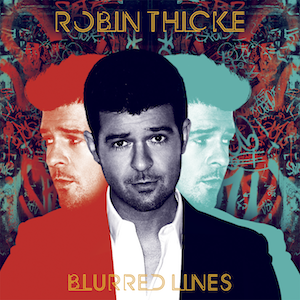Thicke Loses Court Fight to Gaye Family
David Diaz, Senior Executive, Davenport Laroche
The moment the Robin Thicke and Pharrell Williams collaboration “Blurred Lines” hit the airwaves, some producers and musicians said, “hey, wait a minute here!” By the time the song hit, thanks in part to a catchy hook and a cheeky video, there was a lawsuit filed. Now, the decision is in, and a federal appeals court has upheld a copyright infringement verdict.
 The decision confirms allegations that Thicke and Williams “illegally copied” from Marvin Gaye’s hit tune “Got to Give it Up.” The split decision concluded that the Gaye estate should be afforded strong and broad protection in regard to copyrights. One of the judges on the three-judge panel strongly disagreed, offering a dissent that argued that the verdict could stifle creativity. The judge, Jacqueline Nguyen, said: “The majority allows the Gayes to accomplish what no one has before: copyright a musical style… “‘Blurred Lines’ and ‘Got to Give It Up’ are not objectively similar. They differ in melody, harmony, and rhythm. Yet by refusing to compare the two works, the majority establishes a dangerous precedent that strikes a devastating blow to future musicians and composers everywhere.”
The decision confirms allegations that Thicke and Williams “illegally copied” from Marvin Gaye’s hit tune “Got to Give it Up.” The split decision concluded that the Gaye estate should be afforded strong and broad protection in regard to copyrights. One of the judges on the three-judge panel strongly disagreed, offering a dissent that argued that the verdict could stifle creativity. The judge, Jacqueline Nguyen, said: “The majority allows the Gayes to accomplish what no one has before: copyright a musical style… “‘Blurred Lines’ and ‘Got to Give It Up’ are not objectively similar. They differ in melody, harmony, and rhythm. Yet by refusing to compare the two works, the majority establishes a dangerous precedent that strikes a devastating blow to future musicians and composers everywhere.”
The defense in the case loved that line of reasoning, telling the Associated Press: “We stand by the fact that these are two entirely different songs… The thorough and well-reasoned dissenting judge’s opinion is compelling and enhances the prospects for success in a further review by the Court of Appeals.”
Translation: this isn’t over, and we plan to keep fighting.
Meanwhile the victorious attorneys representing the Gaye family saw it very differently: “Despite the protests of the Williams’ camp that the decision somehow stifles creativity, the opposite is true… Today’s ruling encourages writers to create original work that does not take advantage of the success of others while pawning it off as their own.”
One artist sort of left in the middle of all of this is rapper TI, who drops a verse in the middle of the song, but did not collaborate otherwise with the composition or songwriting. The court ruled that he is not liable for any damages awarded in the case.
This is an interesting case with far-reaching consequences for the recording industry. That was certainly clear based on the split reaction of many recording artists. Typically, artists are very strong supporters of copyright protections, but several seemed to be in Thicke’s and Williams’ camp in this scenario (including artist/journalist Ken Kurson.)
According to the Associated Press, members of The Black Crowes and the Go-Go’s, as well as hip-hop artist R. Kelley and composer Hans Zimmer joint about 200 other artists to sign a legal brief speaking out in favor of Thicke and Williams. In part, the brief argued the ruling “had an adverse impact on their creativity” as well as on “the creativity of future artists…and on music in general…”
This advocacy was not exactly expected, and it, more than anything, may argue that this issue is far from settled.